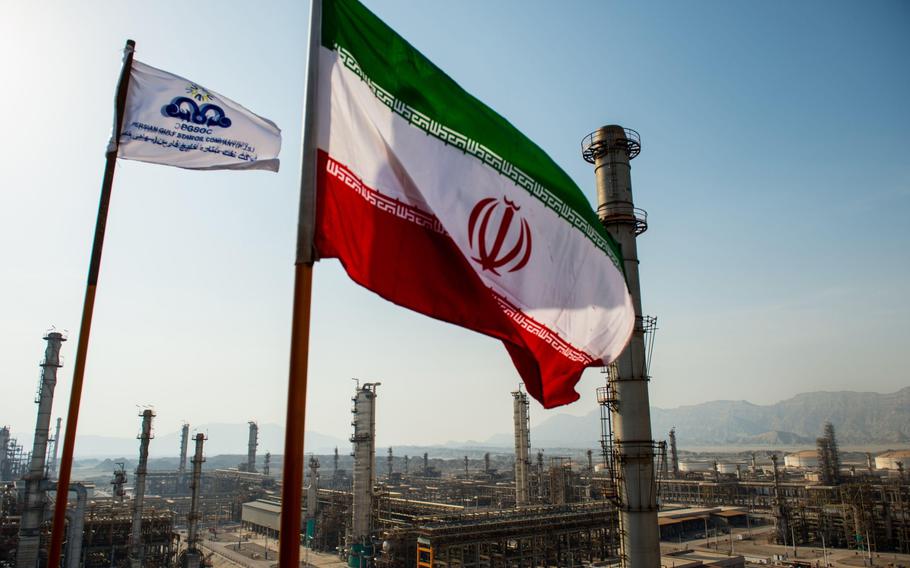
An Iranian national flag. (Ali Mohammadi/Bloomberg)
International monitors are watching Iran's fast-expanding nuclear program with growing alarm as Tehran refuses to extend an expired inspections pact and insists the experts must trust that it's accurately documenting uranium-enrichment activities.
Iran claims it's still preserving data captured by International Atomic Energy Agency monitoring equipment, the agency's director general, Rafael Mariano Grossi, said in an interview in Rio de Janeiro. But officials won't give his investigators access to it until Iran concludes stalled talks with world powers to restore a broader 2015 agreement that lifted sanctions.
"It's a rather uncomfortable situation for us because this assurance is informal in nature and we don't know whether this is the case or not," Grossi said on Monday. "But we do not have a choice."
The deal struck six years ago this month restricted Iran's nuclear activities, but it has crumbled since then-President Donald Trump withdrew the U.S. in 2018. After Trump reimposed sanctions, Iran started breaking caps on its nuclear work, and it has now stockpiled nearly enough highly-enriched uranium to build a warhead.
"We need to verify that all this material at those higher grades is going to remain in peaceful uses," Grossi said. "The only way to do that is to cooperate with the IAEA. If they don't do it, they are outlaws."
While the Biden administration, along with China, France, Germany, Russia and the U.K., have been trying to revive the 2015 accord since April, diplomats are expected to reconvene only next month after new Iranian President Ebrahim Raisi, a hard-line cleric, is installed in office.
The discussions are being closely watched by energy markets anticipating a surge in Iranian oil and gas exports if sanctions on the country's sales are lifted.
Grossi spoke amid reports that policymakers in Washington could start raising the pressure on Iran if talks to revive their agreement fail. Dow Jones reported that the U.S. might target Iran's oil sales to China, which have surged since President Joe Biden entered the White House, if the talks break down.
That's simply one among a number of alternative scenarios the U.S. is thinking about if there's no return to the multinational nuclear accord, according to a U.S. official who asked not to be identified discussing internal deliberations. China is where Iran exports most of its oil today, and the U.S. has conveyed the possibility of new sanctions to China, the official said.
Iran has more than tripled its stockpile of uranium enriched to 60% to 19.6 pounds (8.9 kilograms) from 5.3 pounds (2.4 kilograms) verified by international inspectors in a June report, according to a tweet from Iran's foreign minister last week. That purity of uranium is technically indistinguishable from the material needed to make nuclear weapons, with as little as 10 to 15 kilograms of the highly-enriched metal needed to manufacture a crude nuclear device.
Iran has always maintained that its nuclear program is for civilian uses, but concern in Western capitals and Israel over the potential for bombmaking helped prompt the original agreement.
"We will have to see what the new government decides in terms of returning to the format," said Grossi, whose agency isn't represented at the talks but plays a key role enforcing the deal's nuclear covenants.
Grossi said that his inspectors continue having a presence inside Iran but that their visits are restricted to declared nuclear sites. The IAEA's probe into trace amounts of decades-old uranium found at several locations and linked to Israeli revelations remains at a standstill.
"That is basically stopped," Grossi said. "We have exchanged a few letters, but there is no real engagement."
The failure to clarify the source of the material opens another potential pathway for the U.S. to mount pressure on Iran. Washington's IAEA envoy Louis Bono has suggested the Islamic Republic could face formal censure if progress isn't made in the investigation before September.